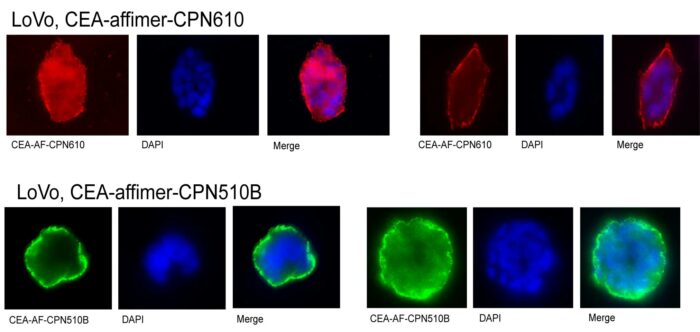In September 2020, Stream began a BBSRC-funded project, in collaboration with The University of Manchester and The Astbury Centre for Structural Molecular Biology and Leeds Institute of Medical Research, both at the University of Leeds (UoL). The project explores the conjugation of our extremely bright, sensitive and stable CPNs™ with an anti-carcinoembryonic antigen (CEA) affimer from UoL, which owns the highest sensitivity among single marker in the order of CEA > cancer antigen 72-4 (CA72-4) > cancer antigen 19-9 (CA19-9).
Incubating in vitro cell models of bowel cancer, the CPN™-CEA affimer molecular probe efficiently labels a colorectal cancer cell model. This confirms the feasibility of developing a transformative quantitative point-of-care diagnostic with lab-based sensitivity, with the potential of multiplexing additional biomarkers to CEA. The aim is to replace the poorly subscribed, (52%) self-administered, postal faecal screening test with a CPN™ lateral flow test, which could also be used in post-surgical operation monitoring. The data from this project is planned to also feed into further research and development of an in vivo molecular probe, for diagnostic imaging of tumours.

Enhancing fluorescence-guided cancer surgery
Our CPNs™ have shown impressive in vitro diagnostic imaging capabilities. With more research the full potential of CPNs for in vivo fluorescence-guided surgery will be established. Our NIR CPNs™, CPN™ 770 and CPN™ 830 (launching March 2021), match the emission of the only clinically approved NIR dye, Indocyanine green (ICG). ICG has known drawbacks with stability and low fluorescence, where CPNs have extremely fluorescent and stable properties.
This is just one example of the impressive ability and versatility of our CPNs™, able to conjugate to a variety of targeting molecules, enhancing a wide variety of research applications. Visit our Antibody Bespoke Linkage Service page or ask us about our LinkBright™ conjugation kits to discover how CPNs™ can enhance your studies.
